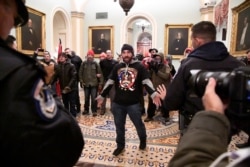Alarmed by the rising threat from domestic extremism, the U.S. military is taking action in the hopes of preventing anyone espousing extremist ideologies from continuing to serve, while also making it tougher for extremist groups to target and recruit soon-to-be military veterans.
U.S. Defense Secretary Lloyd Austin issued a memo to senior military leadership Friday ordering “immediate actions” to counter extremism within the ranks, including updates to screening questionnaires for potential recruits and better training for personnel as they prepare to leave or retire from military life.
The changes come more than two months after Austin ordered all of the military’s commands and services to complete a one-day stand-down (pause in operations) within a 60-day period in order to give commanders a chance to talk to troops about the spread of extremist ideology and the impact it is having both on U.S. military operations and on personnel.
They also come just over three months after the January 6 siege of the U.S. Capitol building by domestic extremists, including several military veterans. Of the more than 300 individuals charged in connection with the siege, more than 30 have U.S. military backgrounds according to a tally by the George Washington University Program on Extremism.
In the memo, Austin said the Pentagon is still reviewing what it has learned but that the operational pause has shown the need to act now.
“There are immediate actions that our subject matter experts here in the department have identified as critical initial steps,” he wrote. “The vast majority of those who serve in uniform and their civilian colleagues do so with great honor and integrity, but any extremist behavior in the force can have an outsized impact.”
In addition to the revamped screening questionnaire for potential recruits and the enhanced training for troops about to leave military service, the memo calls for the military to update and revise the definition of what constitutes prohibited extremist activity.
It also calls for the creation of a commission to further study the extent of the problem.
The Pentagon said Friday that while all the military services and commands completed the stand-downs on time, except for a handful of National Guard and military reserve units that requested extensions, it has not been able to get a full picture of how many troops engaged in extremist activities.
“This is largely about helping us latch up better with civilian law enforcement and what they’re seeing,” Pentagon press secretary John Kirby told reporters.
“Some of this work is already going on,” he added. “Not all offenses that could be inspired by extremist ideology occurs on base or on post or on duty.”
There is also hope that the revamped questionnaires will allow the military to take quicker and more decisive action if evidence of extremist activity on the part of military members is found.
“It's not about anticipating future behavior,” Kirby said of the questionnaires. “It's allowing for accountability by the department should it be determined that in answering the questionnaire, an applicant answered falsely.”
Finding ways to screen out recruits with extremist links before they join, though, is likely to be more difficult, though the Pentagon said it has not given up on finding ways to do that.
In addition to the immediate actions, the new Defense Department memo creates a Countering Extremism Working Group that will examine ways to improve screening capabilities by searching through information already available to the general public, including anything posted using public-facing social media accounts.
The working group, charged with reporting back to the defense secretary within 90 days, will also look at adjusting the Uniformed Code of Military Justice and at ways to better focus existing insider threat programs on extremism.
“One consistent thing that [Secretary Austin] did hear was that the force wants better guidance … a hunger for more information and context,” Kirby said.
Kirby said, for now, much of that focus will be on troops preparing to leave the military.
“There's definitely a sense that more needs to be done to educate and inform transitioning members about who and what they are waiting for them on the other side,” he said.
“We have evidence that some extremist groups are actively recruiting active-duty members as they get ready to transition because they value their leadership capability, their organizational skills, their weapons training,” Kirby said.





